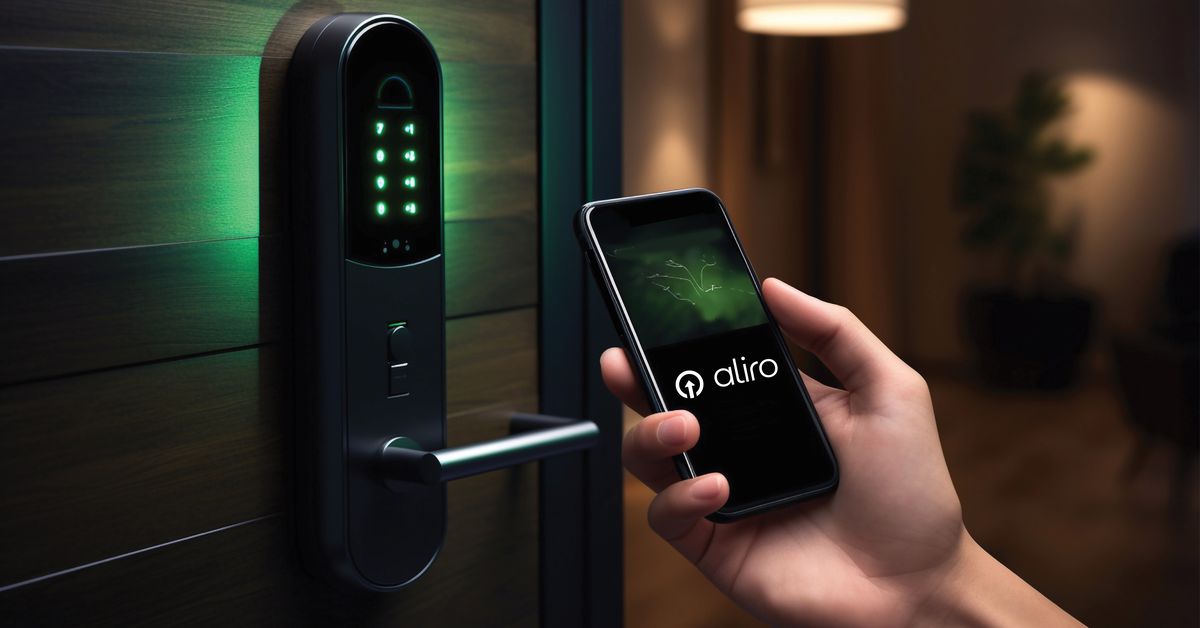
Apple, Google, and Samsung have teamed up with lock makers and chip makers, including Allegion (Schlage), Assa Abloy (Yale), Qualcomm, and NXP, to build an open standard for smart locks and digital keys, using devices like your smartphone or smartwatch. Launching Thursday, the effort is called Aliro, and if you’ve ever enjoyed using Apple’s Home Key technology on your watch or phone to unlock your door, you’ll be excited about this new standard.
But don’t get too excited. It’s going to be a while until Aliro even confirms how it’s going to achieve this digital key nirvana. The working group behind Aliro is part of the Connectivity Standards Alliance (CSA), and spokesperson Nelson Henry told The Verge they’re targeting early 2025 for the first specification.
Aliro — which is Esperanto for “Access” — is being developed by over 200 companies, using the same model the CSA applied to the new smart home standard Matter. Its goal is a global communication protocol and common credentialing system that will allow any authorized smartphone or smartwatch to open any smart lock at home, the office, the gym, or elsewhere, regardless of who made the phone or the lock.
Work began in late 2021 under the name the Access Working Group, and companies on board include Allegion, Apple, ASSA ABLOY, Google, Infineon, Kastle Systems, Last Lock, NXP Semiconductors, Qualcomm, Samsung, and STMicroelectronics.
Aliro’s stated principles are:
Simplicity – Lower barrier to implementation by reducing complexity for integration and streamlining troubleshooting.
Flexibility – Supports different types of installations or architectures, offering convenient access to both common and individual entry points.
Security – Foundation to implement state-of-the-art secured and trusted mobile access solutions.
Interoperability – Standardized communication protocol enables manufacturer-independent devices and readers to work together at the door.
To date, having digital access to your front door, office, hotel room, or gym has largely involved either downloading a proprietary app, needing to have a specific phone, or carrying some kind of tag or card reader. Aliro wants to standardize these access points, making the digital key readily available on your phone or watch (or some other consumer electronic device you might carry with you — earbuds, perhaps?).
At this stage, this is all just an idea. But the end result might look something like Apple’s Home Key: a digital key stored in your phone’s digital wallet and accessible on your watch that doesn’t require a proprietary app and works with any door lock that supports the standard. Access to the key could be controlled and managed by the owner of the lock through an app.
The end result might look something like Apple’s Home Key
“The point here is to build to a solution that can be widely adopted and trusted instead of the current marketplace of individual solutions or solutions that are done unique to this company or that company,” Nelson Henry of Allegion and the chair of the Aliro Working Group, told The Verge in an interview.
Aliro should be a standard solution for the handshake between an access point and a personal digital device, he said. “So, that when something has the Aliro badge, you know it can be a single point of integration that can be used across multiple vendors and technologies, with a credential that can be securely shared.”
Despite being in development for over a year, Aliro is still just a concept. There is no official specification or any actual product available yet, and won’t be for at least 18 months. But it is being spearheaded by Allegion and Assa Abloy, two of the largest lock manufacturers in the world, and with Apple, Google, and Samsung all also involved, it is another strong industry collaboration that might have the muscle to get something done — in the same way Matter has.
“This collaboration aims to raise the bar for an interoperable, consistent, secured, and streamlined mobile access experience at the door or place of entry,” said Lisa Corte of Assa Abloy and the marketing chair of Aliro in a blog post about the launch.
As with Matter, the potential for pitfalls and roadblocks is huge. Aliro appears to be learning by example here and taking a more measured approach to its launch. But there is a lot of work to do, including bringing on board many more companies in the lock and access world before they can even start to finalize a specification that smartphone makers and lock and access point manufacturers can implement.
However, there has been some progress. Corte told me in an interview ahead of the launch that the initial work on the spec has focused on defining the core technologies that will be used. “The specification gives flexibility to address various use cases, defining support for NFC, BLE, and UWB experiences,” she said. NFC is already widely used in many smart locks today (including Apple’s Home Key), as is BLE.
Aliro is a separate endeavor from Matter, despite both being part of the CSA and having many of the same companies involved in developing them. “Aliro only specifies the interaction between the user device, such as a smartphone or wearable, and a digital lock or reader; It does not dictate how that digital lock or reader connects to your backend or in-home ecosystem,” Corte says. “Matter specifies how connected products communicate with each other for a wide variety of smart home use cases. Aliro and Matter do not rely upon each other, but can be complementary to each other.”
There is a lot that’s still unknown here. The group doesn’t have answers to key questions like whether this will be backward compatible with existing door locks or how long it might take to implement in new products. However, if it’s successful it could mean using your phone or watch as a key for everything. A world without multiple apps, key fobs, or cards to unlock your doors sounds like a smart one.
https://www.theverge.com/2023/11/9/23952637/csa-aliro-new-standard-smart-locks-digital-access

